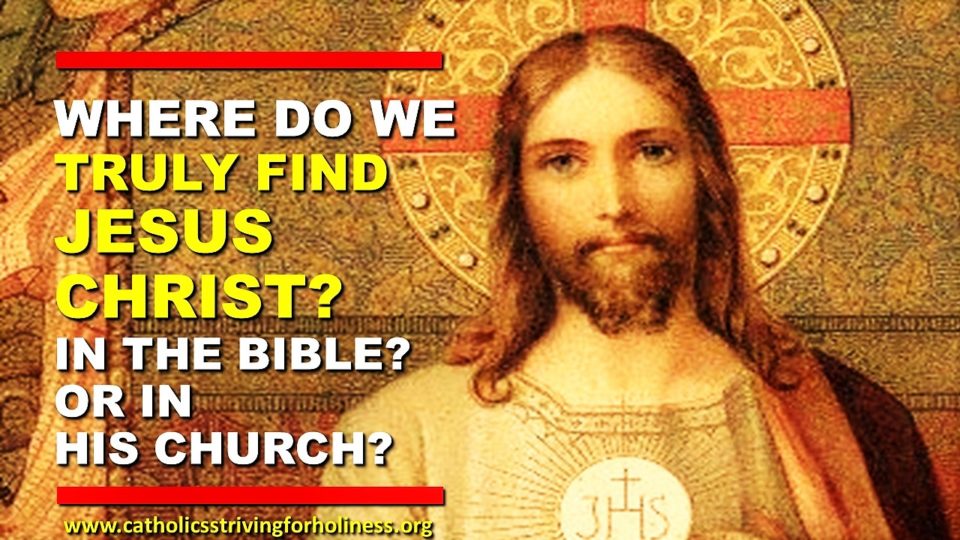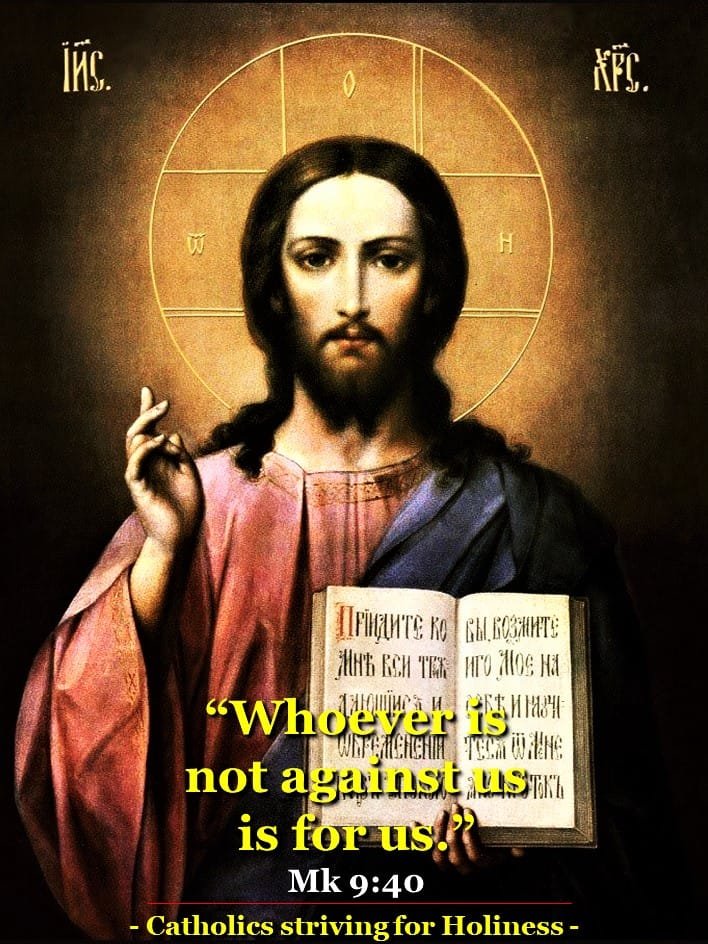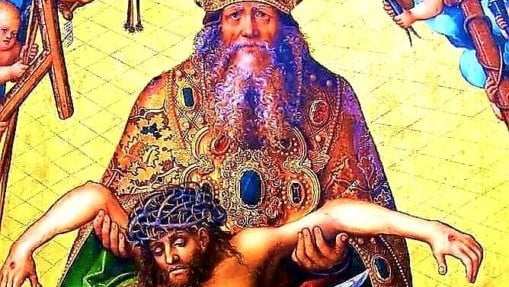WHERE DO WE FIND CHRIST? IN THE BIBLE? OR IN HIS CHURCH?

CHRISTIANITY IS MORE THAN JUST THE HOLY BIBLE,
ACCORDING TO THE BIBLE ITSELF.
- God loved the world so much that He sent His Only-Begotten Son so that all who believe in Him shall not perish but have eternal life (Jn 8:16).
- Jesus is the Way, the Truth and the Life (Jn 14:6). He and the Father are one and He who sees the Him, sees the Father (Jn 10:13). And Jesus was sent by the Father to carry out His PLAN OF SALVATION.
- The Bible came very much later when the Catholic Church determined and approved which books were sacred and thus included in the Canon.
2. Jesus chose His Apostles, with Peter as their head, and gave his authority, power and mission to them.
- Jesus came to save us from our sins with His Passion, Death and Resurrection. In order to prolong his presence and work of salvation, He chose his Apostles to whom He gave his authority, power and mission.
- Jn 20: 21-23: Jesus said to them again, “Peace be with you. As the Father has sent me, so I send you.” 22 When he had said this, he breathed on them and said to them, “Receive the Holy Spirit. 23 If you forgive the sins of any, they are forgiven them; if you retain the sins of any, they are retained.”
- Mt 16:17-19:17 And Jesus answered him, “Blessed are you, Simon son of Jonah! For flesh and blood has not revealed this to you, but my Father in heaven. 18 And I tell you, you are Peter,[a] and on this rock[b] I will build my church, and the gates of Hades will not prevail against it. 19 I will give you the keys of the kingdom of heaven, and whatever you bind on earth will be bound in heaven, and whatever you loose on earth will be loosed in heaven.”
- In the Bible, God gives a new name to a person when He chooses him for a specific mission: Abram to Abraham, Simon to Peter, Saul to Paul.
- In the case of Simon, Jesus gives him the name of Peter (from petros, which means rock), to indicate that Peter himself the the rock chosen by Christ on which He will build His Church.
- In the Church we too know where our Lord is: I will give you the keys of the kingdom of heaven, He declared to Peter, and whatever you bind on earth shall be bound in heaven, and whatever you loose on earth shall be loosed in heaven (Matt 16:19). Not even Simon’s denials of him were sufficient for him to revoke those powers. Our Lord, once He had risen from the dead, confirmed those powers in a solemn way: Feed my lambs … Feed my sheep (John 21:15-17). The Church is where Peter and his successors – and the bishops in communion with him – are.
- Pope Benedict XVI recalled how St. Cyprian, an Early Church Father, never wearied of repeating that “if a man deserts the Chair of Peter upon whom the Church was built, does he think that he is in the Church?” (cf. De unit. [On the unity of the Catholic Church], 4). Cyprian knew well that “outside the Church there is no salvation”, and said so in strong words (Epistles 4, 4 and 73, 21); and he knew that “no one can have God as Father who does not have the Church as mother” (De unit., 6). An indispensable characteristic of the Church is unity, symbolized by Christ’s seamless garment (ibid., 7): Cyprian said, this unity is founded on Peter (ibid., 4), and finds its perfect fulfilment in the Eucharist (Epistle 63, 13). “God is one and Christ is one”, Cyprian cautioned, “and his Church is one, and the faith is one, and the Christian people is joined into a substantial unity of body by the cement of concord. Unity cannot be severed. And what is one by its nature cannot be separated” (De unit., 23) (6 June 2007).
- Nobody can say that he loves God if he does not choose the way to him – Jesus – laid down by God himself. This is my beloved Son… listen to him (Matt 17:5). We act illogically if we claim to be Christ’s friends and at the same time spurn his words and his wishes.
4. Upon giving them their authority, power and mission, Jesus appointed the Apostles as his instruments to preach the Gospel establishing His Church on earth to continue His mission
John 20: 21 Jesus said to them again, “Peace be with you. As the Father has sent me, even so I send you.” 22 And when he had said this, he breathed on them, and said to them, “Receive the Holy Spirit. 23 If you forgive the sins of any, they are forgiven; if you retain the sins of any, they are retained.”
- “What did he wish in regard to the Church founded, or about to be founded? This: to transmit to it the same mission and the same mandate which he had received from the Father, that they should be perpetuated. This he clearly resolved to do: this he actually did. ‘As the Father hath sent me, even so I send you’ (Jn 20:21). ‘As thou didst send me into the world, so I have sent them into the world’ (Jn 17:18). . . .When about to ascend into heaven he sends his Apostles in virtue of the same power by which he had been sent from the Father; and he charges them to spread abroad and propagate his teachings (cf. Mt 28:18), so that those obeying the Apostles might be saved, and those disobeying should perish (cf. Mk 16:16). . . . Hence he commands that the teaching of the Apostles should be religiously accepted and piously kept as if it were his own: ‘He who hears you hears me, and he who rejects you rejects me’ (Lk 10:16). Wherefore the Apostles are ambassadors of Christ as he is the ambassador of the Father” (Leo XIII, Satis cognitum).
5. Jesus taught his Apostles the meaning of the Scriptures, showing the necssity of a sole authority- the Church Magisterium- in teaching and interpreting the Scriptures in matters of faith and morals.
Throughout his public ministry, and even after His Resurrection, we see Jesus’ initiative and concern to form his disciples, explaining them the parables, revealing to them the mystery of the Holy Trinity, showing them how to live the different virtues,…in conclusion, explaining to them the meaning of the Scriptures.
- All these indicate that Jesus wanted them to faithfully learn and transmit His teachings to those who would come to form part of the Church He established on them, constituting them as the teachers and interpreters of His doctrine.
It is very interesting to note that in I Timothy 3:15 we see, not the Bible, but the Church – that is, the living community of believers founded upon St. Peter and the Apostles and headed by their successors – called “the pillar and ground of the truth.”
- Of course, this passage is not meant in any way to diminish the importance of the Bible, but it is intending to show that Jesus Christ did establish an authoritative and teaching Church which was commissioned to teach “all nations.” (Matt. 28:19).
- Elsewhere this same Church received Christ’s promise that the gates of hell would not prevail against it (Matt. 16:18), that He would always be with it (Matt. 28:20), and that He would give it the Holy Spirit to teach it all truth. (John16:13).
- The interpretation of the Scriptures is entrusted to an authority which is composed of the Apostles and their successors themselves, thus forming the core of what is now known as the Church Magisterium, the official interpreter of the Scriptures and of matters regarding faith and morals.
6. Jesus instituted the Sacraments as necessary means for Salvation.
- Jesus gave the Apostles the power to “forgive sins” (Jn 20:23).
- Peter taught that “Baptism now saves you” (1 Pt 3:21) and thus is not a mere stimulus of and to faith; rather, Baptism is necessary for salvation.
- The Bible also speaks about “anointing the sick with oil” (Jas 5:14-15), two kinds of laying of hands (Acts 8:17; 2 Tim 1:6), and marriage in the Lord (1 Cor 7:39).
- But above all, Jesus is truly found in His Church. He instituted the Sacrament of the Holy Eucharist, where He is truly, really and substantially present: “This is my Body…this is the chalice of my Blood.” Jesus repeatedly said that “he who eats my flesh has eternal life”. This is no figure of speech, for he did not give in when “many of his disciples” left due to this “hard saying” (Jn 6:48-68), and St. Paul taught that he who eats the bread unworthily is “guilty of profaning the Lord’s body” (1 Cor 11:28).
- Ignatius of Antioch said “the Eucharist is the flesh of the Redeemer,” Irenaeus “we receive the bread as Jesus”, and Cyprian “Christ is our bread”.
- JESUS CHRIST INSTITUTED THE MEANS – THE SACRAMENTS- AS SOURCES OF GRACE, NECESSARY FOR SALVATION.
7. The Sacred Scriptures affirm that not everything Jesus had taught are contained in them.
St. John’s final sentence in his Gospel (21:25) states categorically: But there are also many other things that Jesus did; if every one of them were written down, I suppose that the world itself could not contain the books that would be written.
- His conclusion is very clear to prove that Christianity and all that Our Lord Jesus Christ did are not contained in the Scriptures. This also implies the necessity of Sacred Tradition.
St. Paul both commends and commands the keeping of oral tradition. In 1 Corinthians 11:2, for instance, we read,
“Now I praise you, brethren, that in all things you are mindful of me: and keep my ordinances as I have delivered them to you.”
- Paul is obviously commending the keeping of oral tradition here, and it should be noted in particular that he extols the believers for having done so (“I praise you….”). Explicit in this passage is also the fact that the integrity of this Apostolic oral tradition has clearly been maintained, just as Our Lord promised it would be, through the safeguarding of the Holy Spirit (cf. John16:3).
- Perhaps the clearest Biblical support for oral tradition can be found in 2 Thessalonians 2:14(15), where Christians are actually commanded: “Therefore, brethren, stand fast; and hold the traditions which you have learned, whether by word, or by our epistle.” This passage is significant in that
- it shows the existence of living traditions within the Apostolic teaching,
- it tells us unequivocally that believers are firmly grounded in the Faith by adhering to these traditions, and
- it clearly states that these traditions were both written and oral. Since the Bible distinctly states here that oral traditions – authentic and Apostolic in origin – are to be “held” as a valid component of the Deposit of Faith, by what reasoning or excuse do Protestants dismiss them? By what authority do they reject a clear-cut injunction of St. Paul?
- Furthermore, we cannot deny the role which oral Tradition had in the diffusion of Christianity and in the life of the early Church.
- THE SCRIPTURES AFFIRM THAT NOT ALL JESUS HAD TAUGHT ARE CONTAINED IN THEM, IMPLYING THE NECESSITY OF THE SACRED TRADITION.
8. Jesus gave us His mother to be our mother.
- Catholics do not worship Mary: worship is only due to God. However, Catholics follow and strive to imitate Jesus. He obeyed the fourth commandment: Honor your father and mother. Honor in Hebrew is kaboda, which means to glorify.
- The Bible calls Mary “Mother of my Lord” (Lord = God) and says all generations will call her blessed (Lk 1:43.48). It shows that she is the New Ark of the Covenant, the woman clothed with the sun, crowned in heaven with twelve stars (Rev 11:19-12:1).
- To honor his mother, Jesus’ last message to us on the cross is: Behold, your mother (Jn 19:27).
- Catholics honor and love Mary without fear of erring because upon doing so, they are imitating not only Jesus’ love for His Mother, but also the love of the Father and the Holy Spirit: Mary is the Daughter of God the Father, Mother of God the Son, and Spouse of the Holy Spirit (Saint Josemaria)
9. Jesus taught that He is the fulfillment of the Scriptures.
- After reading Isaiah 52:21, St. Luke narrates that “he rolled up the scroll, gave it back to the attendant, and sat down. The eyes of all in the synagogue were fixed on him. 21 Then he began to say to them, “Today this scripture has been fulfilled in your hearing.”
- Jesus taught that He is the fufillment of the Scriptures and that the entire Old Testament must be interpreted in this context.
- Hence, an isolated citation and literal interpretation of the Old Testament disconnected from this fact, which is very common among the non-denominational sects, is erroneous.
10. Jesus insisted on the necessity of man’s cooperation to his grace.
- As we all know they (the Born-again and some fundamentalist/evangelical protestants, and other sects) believe that their salvation comes from -the Lutheran tenet which posits that- the mere acceptance of Jesus as their Savior: the so-called “faith alone” (sola fide) position would be sufficient in order to be saved.
- This position, HOWEVER, is ERRONEOUS and NOT BIBLICAL from the CATHOLIC viewpoint.
- ‘As the Bible says, I AM ALREADY SAVED (Rom 8:24, Eph 2:5-8),
but I’m also BEING SAVED (1Cor 1:18, 2 Cor 2:15, Phil 2:12), and
I have the HOPE THAT I WILL BE SAVED (Rom 5:9-10, 1 Cor 3:12-15). Like the apostle Paul, “I am WORKING OUT MY SALVATION IN FEAR AND TREMBLING (Phil 2:12), with the HOPEFUL CONFIDENCE IN THE PROMISES OF CHRIST (Rom 5:2, 2 Tim 2:11-13).” - Our Lord Himself underlined the fact that we should enter by the “narrow gate,” because ” the kingdom of heaven has suffered violence, and the violent take it by force (Mt 11: 12),” meaning that in order to be saved, Jesus taught that man’s cooperation to his grace through interior struggle and good words is necessary, and thus faith alone does not suffice.
With the above arguments based on the Sacred Scriptures, the Bible refutes the “Bible alone” principle held by some sects. There is more to Christianity than just the Bible, and the Bible itself teaches this.
In the Church He founded – the Catholic Church-, and this, affirmation, is based on the teachings of the Holy Bible.
- Hence, it is not possible to love, follow or listen to Christ, without loving, following or listening to the Church, because she is the presence, at once sacramental and mysterious, of Our Lord, who prolongs his saving mission in the world to the very end of time.
- In her, and through the Sacrament of Baptism, we become members of the body of him whom Our Lady conceived, gestated, and brought into the world. This is why the Blessed Virgin is Mother of the Church, that is to say, Mother of the whole people of God, both faithful and pastors (Paul VI, Address 21 November 1964).
Stay updated: subscribe by email for free TO OUR NEW WEBSITE www.catholicsstrivingforholiness.org (PUT YOUR EMAIL IN THE SUBSCRIBE WIDGET).
We are also in www.fb.com/Catholicsstrivingforholiness. Kindly help more people in their Christian life by liking our page and inviting your family, friends and relatives to do so as well. Thanks in advance and God bless you and your loved ones! Fr. Rolly Arjonillo


